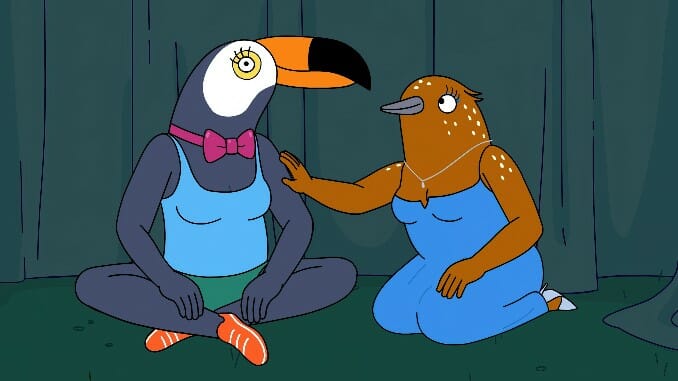Tuca & Bertie Season 3 Is Still the Millennial Manifesto We Desperately Need
Image courtesy of Adult Swim
Out of the many ongoing comedies that discuss the trials and tribulations of navigating everyday life as a millennial, no show has come close to being as distinctly imaginative and profound as Lisa Hanawalt’s Tuca & Bertie. The animated sitcom follows the misadventures of two girlie birdy besties in their 30s—bodacious toucan Tuca Toucan (Tiffany Haddish) and anxious song thrush Bertie Songthrush (Ali Wong)—living in an anthropomorphic animal and plant city, and has made its place as one of the best adult animated series airing today. After its unprecedented Netflix cancellation in 2019 immediately following its inaugural premiere—one of the dumbest mistakes the streamer has made—Adult Swim swooped in and picked up the show. Throughout its run thus far, the show has explored a myriad of timely themes such as anxiety, mental health, gaslighting, trauma, and toxic relationships in a well-balanced approach using vibrant imagination, subtlety, and/or raunchy outrageousness. Recently the series entered its third season in its more suitable home and it hasn’t skipped a beat, soaring higher than ever before.
Picking up after the events of Season 2, the titular duo have entered a new chapter in their lives. The junior season finds Tuca and Bertie attempting to restructure themselves after the destructive flood and moss that infiltrated their city of Birdtown. Bertie’s pursuit of her independent baking service gets put on the backburner when she begins a new job offer working for a famous chef idol of hers. Tuca finds newfound stability both professionally and romantically after breaking up with her gaslighting girlfriend Kara. She has a secure job as a tour guide for the city’s new waterway stream, a position that works for her upbeat personality perfectly, and a new relationship with a muscular tree named Figgy (who has the seductive voice of Matthew Rhys). Though these new positions are ever so promising for the two, they’re simply set-ups for the season to explore new subjects that further the psychological hurdles they must face.
From the jump of the premiere episode “Leveling Up,” Tuca & Bertie dives head first into exploring variations of anxiety specifically with imposter syndrome, a subject that is rarely depicted or discussed in media. As Tuca’s life fast-tracks to normalcy and prosperity (she’s valued at her job and is in—what at first seems to be—a healthy relationship), she begins experiencing self-doubt. The overwhelming weight goes full throttle as Tuca’s over-enthused boss gives her a double promotion, resulting in her self-sabotaging because all of this goodness is new to her, and she doesn’t feel deserving of it.
Much like the previous seasons, the colorful, ever-changing world-building of Birdtown paves way for Hanawalt and her team of writers to explore the intrusive psyche of her characters and discuss thematic material that resonates with fellow millennial viewers. A great example comes in the recent episode titled “The One Where Bertie Gets Eaten by a Snake,” where Birdtown is infested by baby snakes who are straight up eating folks across the city. Bertie is finding difficulties in her day-to-day life being both far too approachable, as strangers engage her in unwanted conversation, and feeling unvalued at her baking new job under Chef Garcia (Justina Machado). When a snake comes to her door and gobbles her down, her social anxieties wither away as she finds newfound confidence in the skin not entirely her own.
-

-

-

-

-

-

-

-

-

-

-

-

-

-

-

-

-

-

-

-

-

-

-

-

-

-

-

-

-

-

-

-

-

-

-

-

-

-

-

-








































